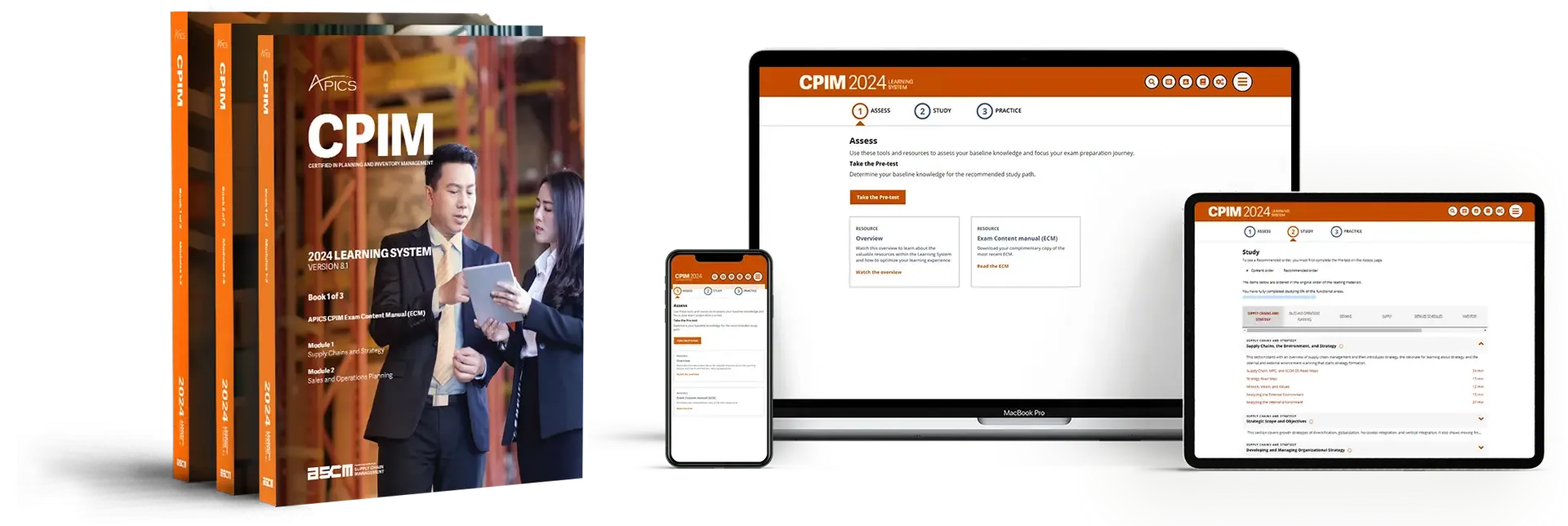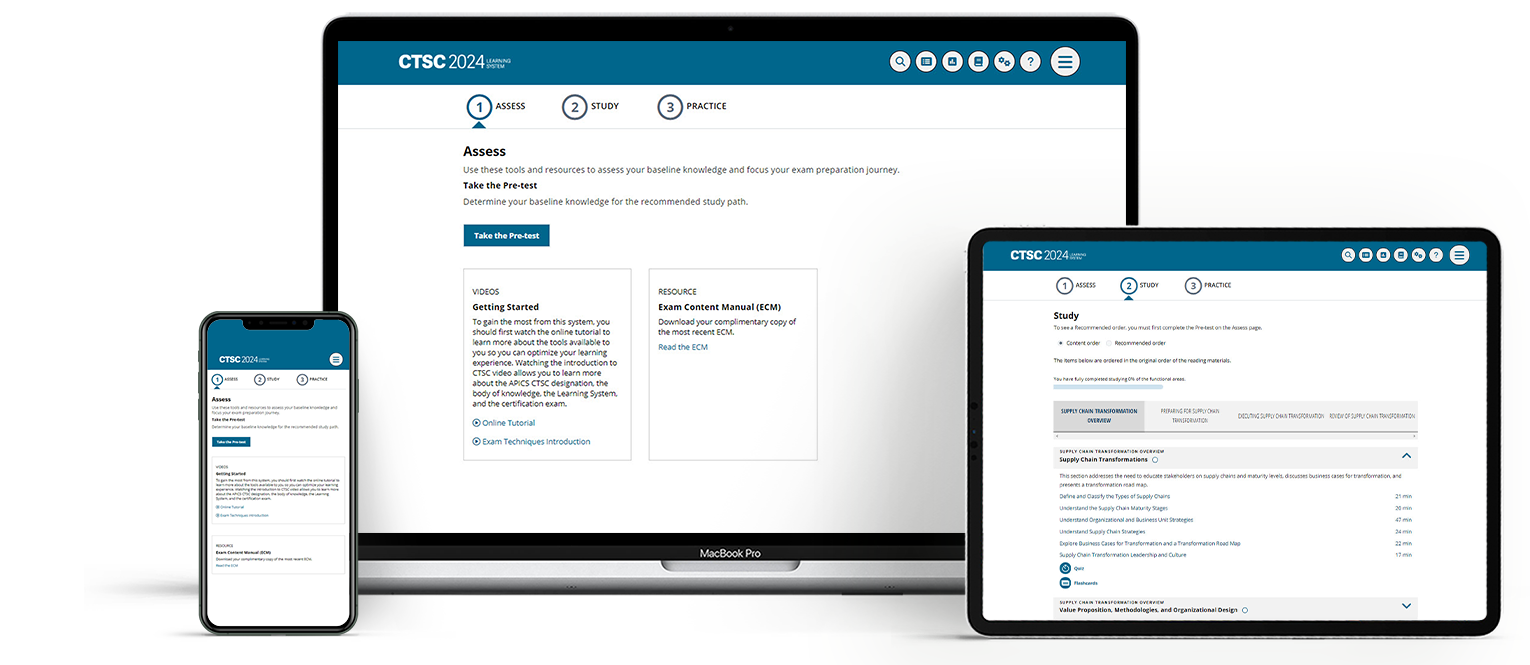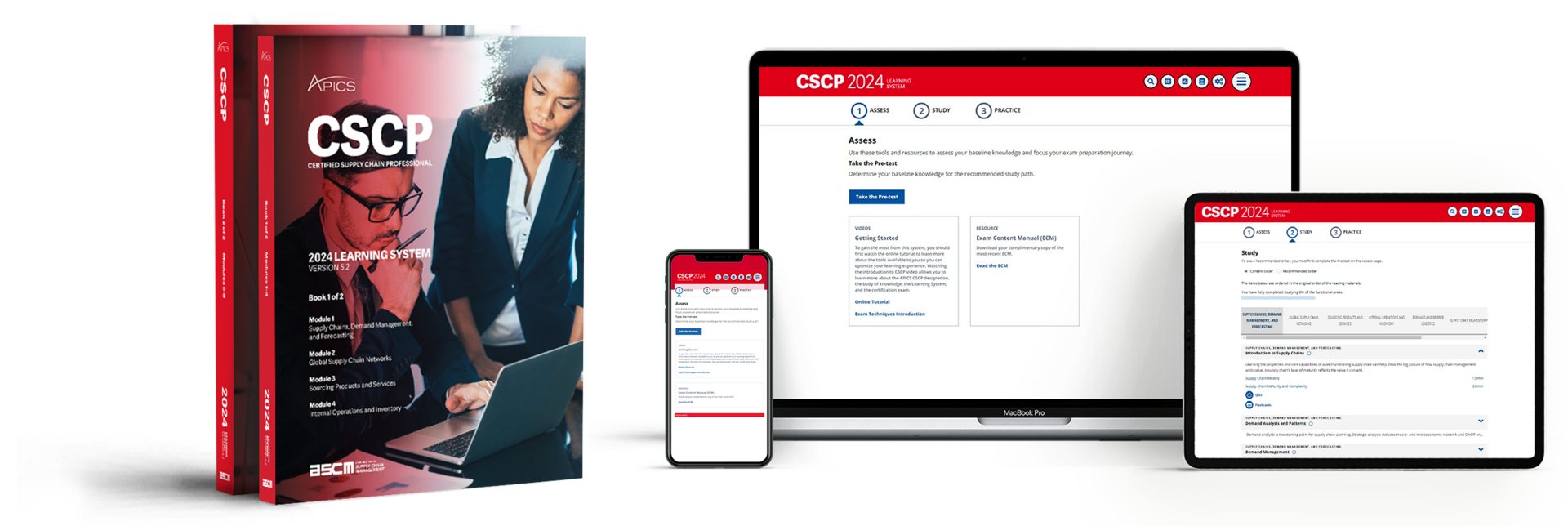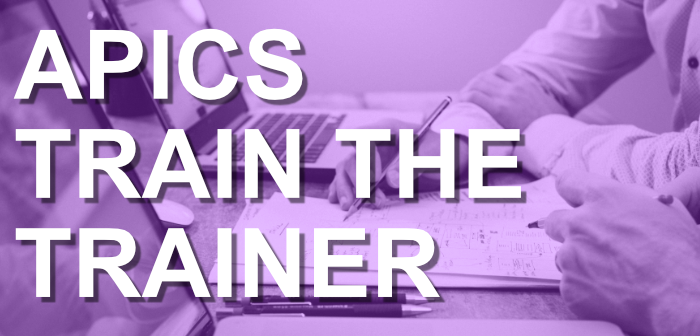APICS CLTD
APICS CLTD is a course for people who build and improve various logistics and distribution processes. CLTD stands for Certified in Logistics, Transportation, and Distribution. It is a global program that sets the standard for logistics certification.
In the next few years, there is a growing demand for trained professionals in the field of logistics, transportation, and distribution. APICS CLTD meets the need for high-level professionals who can implement and maintain innovative concepts in their supply chains. These innovations are necessary to take advantage of the rapid developments in transportation and distribution, such as e-commerce, globalization, and shorter lead times.
APICS Certifications: The Global Standard in Supply Chain Management
Visie Partners is an ASCM Partner
We are a Premier Training Partner and Authorised Consulting Partner of ASCM in the Netherlands. Our expertise guarantees top-level training, aligned with the latest international standards.
Benefits of a CLTD certification
Our CLTD program has many learning objectives, of which these are some:
- Designing logistic systems that match the supply chain strategy.
- Knowing the trade-offs concerning the delivery performance, inventory levels, and the usage of logistics capacity.
- Analyzing the costs and benefits of policy adjustments.
- Finding possibilities to shorten or improve the logistics processes.
- Report on the effectiveness of processes by using performance indicators.
- Indicate how IT can be helpful to achieve logistics goals.
- Make risk assessments based on the understanding of cost patterns.

Made for:
The course is made by APICS for those responsible for transportation and distribution management. Most of our CLTD students are managers or engineers in the following areas:
- Logistics
- Supply chain logistics
- Traffic
- Transportation
- Fleet
- Warehouse operations
- Distribution
- Reverse logistics
Required knowledge
To follow the APICS CLTD course, the student should have English reading skills (the study material and exams are in English). It also helps if students have some experience in logistics management.
€ 3.035,- / excl. vat & exam
Live sessions with APICS-certified instructors, scheduled dates and times. High pass rate + access to our online learning environment.
- 36 Instructional hours, spread over 12 lessons
- Live sessions at fixed times
- Same quality as classroom training
- Accessible anywhere with internet
- Pass rate above 90%
Online Lessons During the online sessions, you follow a live course in a virtual classroom, led by an experienced APICS CLTD trainer. You log in at set times to go through the material together with fellow students, with plenty of room for questions and discussions—just like in a physical classroom.
Interactive Sessions The trainer explains the theory, shares real-life examples, and keeps the sessions engaging and interactive, helping the material to really stick.
Online Learning Platform You get access to an online platform with practice questions and progress tracking tools, so you can continue learning outside of class and your trainer can monitor your development.
Benefits This approach combines the quality of in-person learning with the convenience of studying from anywhere.
End date: 13/10/2026
The lessons will be on Tuesday from 18:45 until 21:45 CET
The course schedule will be Weekly.
Registration deadline: 3 weeks before the course (12/05/2026). Later registration is possible, please contact us for options.
Register for APICS CLTD online
€ 3.395,- / excl. vat & exam
High pass rate thanks to intensive guidance and proven teaching methods.
- 36 instructional hours, in 12 evenings or 6 full days
- Engaging in in-person sessions at fixed times
- Same quality as traditional classroom training
- Also accessible online wherever there is internet
- Pass rate above 90%
Classroom Training In our classroom-based training, you regularly meet with fellow participants and an experienced instructor in a physical classroom setting. The group follows a fixed course schedule (e.g. weekly) at a central location, where the trainer explains and expands on the theory using real-world examples.
Interaction and Group Learning There is plenty of room for interaction: you’ll discuss case studies, share experiences with peers, and learn from each other in a group setting. Thanks to the direct contact and classroom dynamics, you receive immediate feedback and stay sharp and motivated.
Benefits and Outcomes This traditional approach in a physical setting offers a powerful learning experience and prepares you thoroughly for the exam.
End date: 18/12/2026
The lessons will be on Friday from 09:30 until 16:45 CET
The course schedule will be Monthly.
Registration deadline: 4 weeks before the course (15/05/2026). Later registration is possible, please contact us for options.
Register for APICS CLTD Utrecht
€ 2.110,- / excl. vat & exam
E-learning (blended learning): You set your own schedule, and contact moments with an experienced instructor are tailored to it. Communication takes place via web conferencing software or by phone. You can start at any time.
- APICS CLTD Learning System
- 8 hours of guidance in 4 sessies
- Support via email
- Optional upgrade to online or classroom training
- Pass rate above 60%
Introduction The guided e-learning format is a blend of self-study and personal coaching. You study independently using the official APICS CLTD textbook and online platform, while being supported remotely by an experienced APICS CLTD trainer.
Study Plan and Guidance Together, you'll create a study plan that fits your schedule and preferred pace. You'll regularly connect with your trainer online (via video call, chat, or phone) to review your progress, ask questions, and clarify difficult concepts. This can follow either a weekly or monthly rhythm.
Support and Communication In between sessions, you can ask questions by email and will receive a response within two working days. You also have the option to join an exam training session to prepare thoroughly for the final test.
Benefits This flexible approach offers the best of both worlds: the freedom of self-study combined with expert support tailored to your needs—boosting both your confidence and your chances of success.
€ 1.300,- / excl. vat & exam
€ 1.926,- / incl. exam /excl. vat
With self-study, you receive all course materials and get access to the online learning platform. There is no interaction with a trainer. You can start at any time.
- APICS CLTD learning system
- Upgrade to guided e-learning available
- Upgrade to classroom or online lessons available
- Pass rates below 60%
If you choose the self-study option, you will complete the APICS CLTD programme entirely on your own, without classroom sessions or scheduled contact times.
Study Materials You will receive all official study materials – including the English-language textbooks and access to the online learning platform with practice questions, assessments, and other helpful tools – to prepare thoroughly for the exam.
Study Structure and Pace You decide how and when you study: start whenever you like and plan your learning flexibly around work and personal commitments.
Benefits and Requirements There is no direct support from a trainer, which means you’ll need a healthy dose of self-discipline. In return, you gain maximum freedom. This approach allows you to work towards the internationally recognised APICS CLTD exam at your own pace, from any location, at any time.
€ **.**
Ideal for larger teams in need of training. All study formats are available.
- Customised content
- Group discounts
- Flexible scheduling
In-Company Training An in-company training offers a customised programme exclusively for your organisation. An experienced trainer delivers the sessions for your team, on-site or online, and flexibly adjusts the schedule to minimise disruption to daily operations.
Tailored and Practical Approach The course content is adapted to your specific business processes and examples, making the training directly relevant to day-to-day operations. The programme thoroughly covers the official APICS CLTD curriculum, while leaving space for company-specific cases and discussions.
Benefits and Outcomes Because colleagues learn together in their work environment, this strengthens team spirit and creates a shared knowledge base within the company. This tailored approach results in highly effective training with immediate applicability and added value for your organisation.
Bundle It
For each study option, you can purchase the exam directly at the start of the course for exam surcharge: € 955,-(excl. VAT).
When the exam is ordered together with the course, one free retake is included. The exam is valid for 365 days, and the retake is valid for 180 days, but only after a student has failed their first attempt.
Printed Books or Fully Digital?
For each study option, we ship physical course materials free of charge to addresses within the EU and the United Kingdom, except for Greece, Cyprus, and Malta. Do you want delivery in one of these countries or outside the EU? That is possible after we provide a quotation.
Prefer digital study?
You can choose to learn with e-books. In that case, you will receive a €50 discount and additional instructions on downloading the official APICS CLTD e-books. You can indicate this when placing your order.
Course Material
During the course, the most recent, official English-language course materials are used:
-
APICS CLTD learning system
-
APICS CLTD student slides
APICS Online Learning System:
-
Online quizzes and practice exams (including reports and analysis)
-
Glossary and explanatory terms (also available via dictionary app)
-
Flashcards for terminology
-
Online study guide and study planning tool
-
Digital APICS CLTD course books (for e-reader/tablet)
ASCM Membership
With every APICS course, we include a free one-year ASCM membership with certification upgrade. This membership grants you access to additional tools and materials on the ASCM website and stops automatically after one year.
Visie Partners Online Learning Environment
Visie Partners has developed its online learning environment. With this platform, Visie Partners distinguishes itself by offering online study opportunities with background information and practice questions.
Our learning environment contains hundreds of practice questions for the course. These additional exercises provide insights into study progress for both participants and instructors.
This online learning environment is available to e-learning and self-study students and those attending classroom sessions.
Time investment
The study time of APICS CLTD will be between 90 and 140 hours. The study time varies on the experience and training of each participant. The study effort will consist of the following:
- Day course (approx. 7 hours) or evening course (3 hours)
- Preparation course meeting (approx. 5 - 10 hours)
- Exam preparation

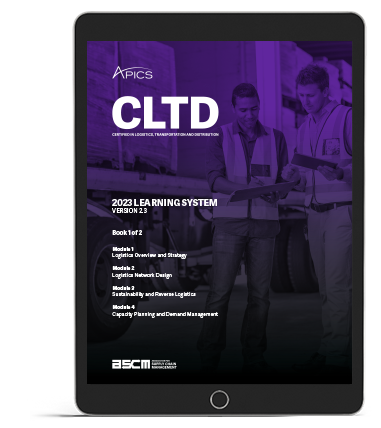
Exam and maintenance
After passing the APICS CLTD exam, you receive the official certificate and are officially certified for 5 years. After completion, you can use the course name as a title. The certificate can be extended by 5 years if the student maintains the acquired knowledge. Examples to do this are organizing or attending supply chain related activities or participating in courses.
We offer certified professionals that have obtained their certificate via Visie Partners the opportunity to earn maintenance points for maintaining their title. Customers of Visie Partners have the opportunity to take part in company visits and network meetings related to operations- or supply chain management. No membership is required for this.
Participants can register for the exam via www.apics-exam.eu. On this website, all exam prices and information about the exam registration procedure can be found.
After you've finished the course and choose not to take the exam, we can hand out a participation certificate.
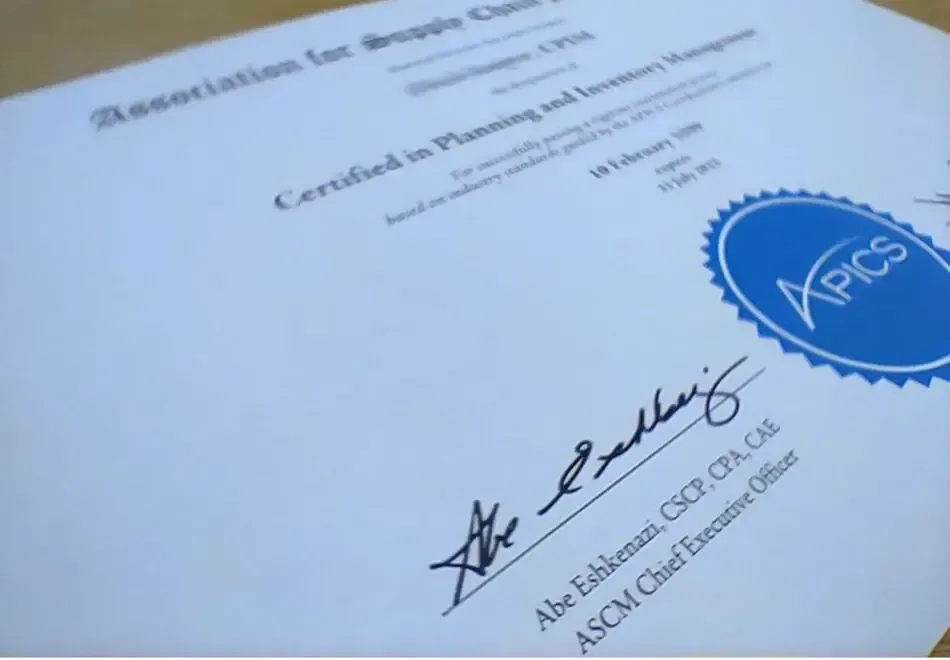
Contents of APICS CLTD
Frequently asked questions about APICS CLTD
APICS certifications are globally recognized credentials in supply chain and operations management. They help professionals build real-world skills and advance their careers.
It depends on your role and goals:
-
APICS CPIM is for inventory and production planning
-
APICS CSCP is for end-to-end supply chain strategy
-
APICS CLTD focuses on logistics and distribution
-
APICS CTSC is about driving supply chain transformation
Not sure? Contact us. We’ll help you choose the right path.
Most APICS courses take 6 to 12 months to complete, depending on your pace. Most APICS programs require between 160 and 220 hours of study, depending on your previous experience.
Yes. You can do all our courses online with expert-led virtual classes, flexible study options, and/or on-demand content. The course materials come in both paper books and a downloadable E-book.
Our course fee includes:
- 1-year ASCM membership with Certification Upgrade (worth €200)
- APICS Learning System with quizzes and flashcards (valid for 1 year)
- Support from Visie Partners
- Shipping of course materials within the EU and UK (except Greece, Cyprus, Malta)
If you live outside the EU or don’t need physical books, contact us before registering.
Depending on the chosen study option & package, it can also include
- Instructor-led sessions
- Official APICS CLTD exam registration
Prices vary by course. For APICS CLTD we our cheapest option to get certified is a selfstudy bundle incl. exam which costs: € 1.926,- / incl. exam /excl. vat.
For other prices, please scroll to the study options. You can contact us for a full quote or group pricing.
The exam is challenging but fair. With the right preparation and expert support, most learners pass on their first try. We're here to help you every step of the way. The exam consists of multiple-choice questions and is designed to test both knowledge and the ability to apply practices learned in the materials.
When you expand the study option & start date, you can click through to our registration form by clicking "Register" on any course page. Once this form is completed, we will contact you to confirm your registration.
If the form can not be submitted, please print the page as a PDF and send it to us.
No. Exam fees are not included unless stated otherwise. You can check current pricing or purchase your exam at apics-exam.eu.
VAT is added in accordance with your country's regulations.
- If your company is based outside the Netherlands and has a valid VAT number, we can invoice VAT reversed.
- For non-companies inside the EU, we use their country's VAT
- All prices listed are exclusive of VAT and exam fees, unless otherwise noted.
option: Individual online exam training of approximately 3 hours for € 250, which can be booked at any time.
To purchase an exam, you need to go to our exam portal apics-exam.eu. On this page, you can also see the current exam pricing. When the exam request form has been filled, it is possible after three working days to plan your exam from your ascm account. . When you opt to purchase an ASCM membership, it can take up to a week.
Our general terms and conditions apply. All prices mentioned are excluding VAT. We reserve the right to change the course and exam fees as long as no agreement has been reached.
Discover other APICS Programs:
